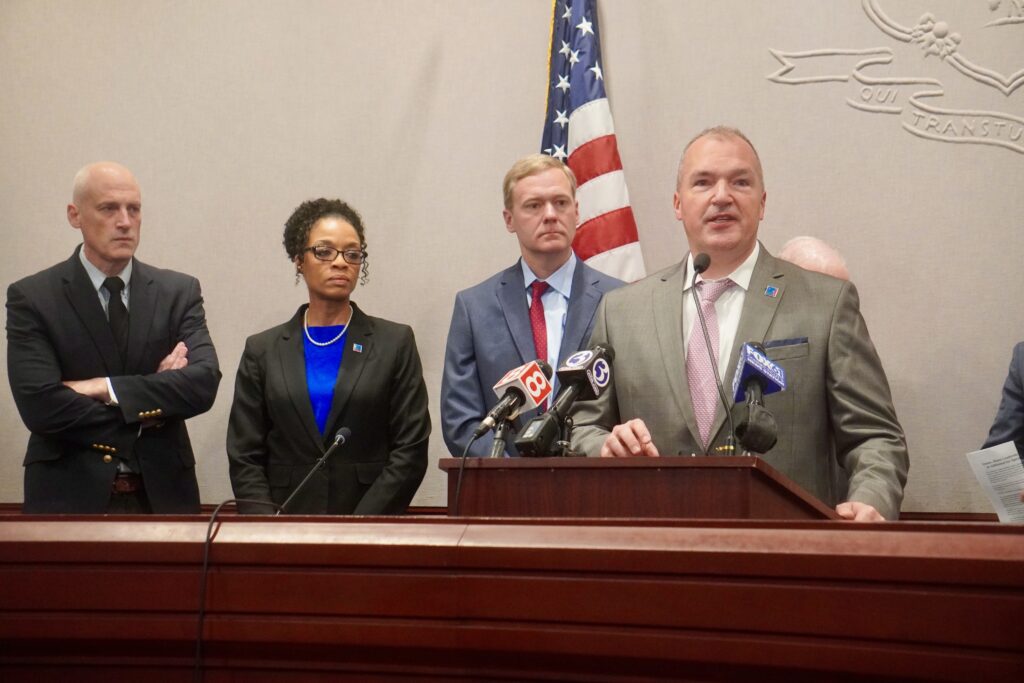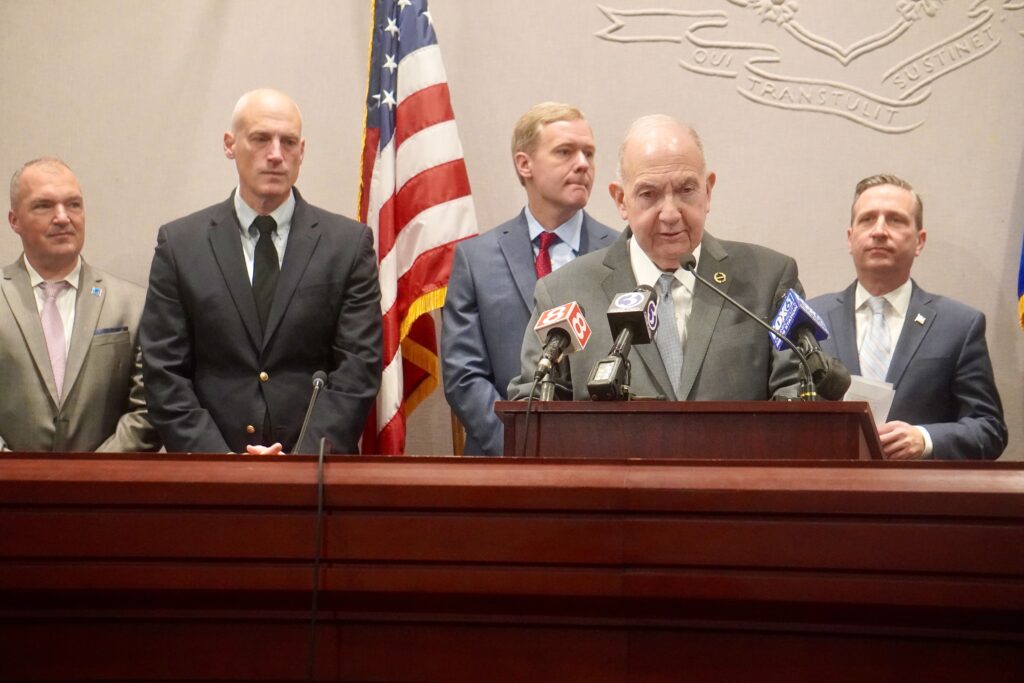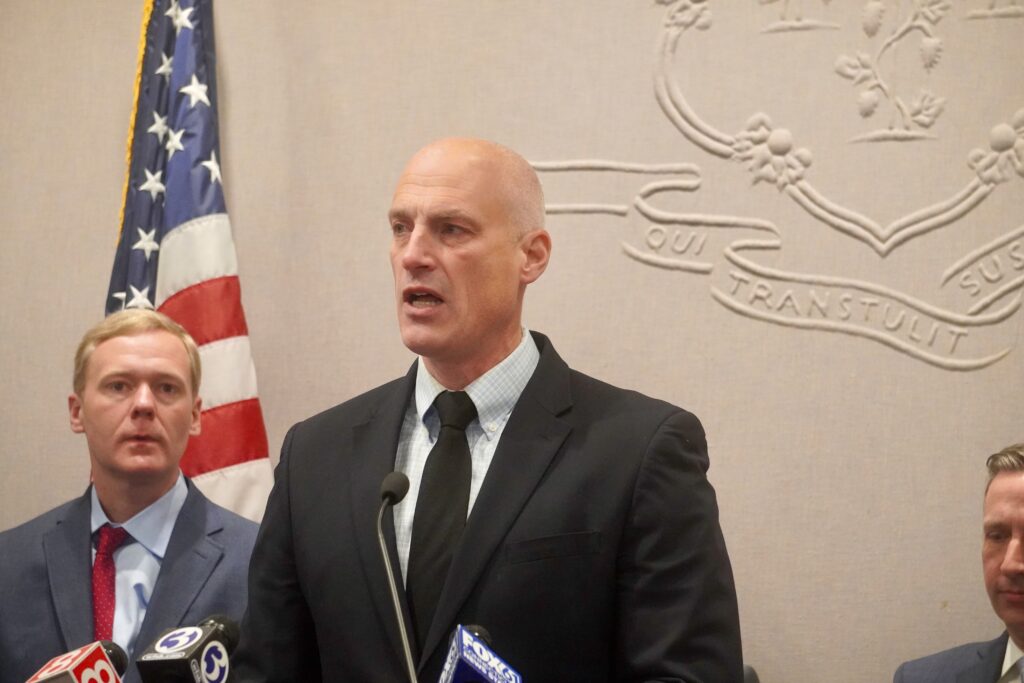Legislators Announce Allocation for Special Education Funding, Will Close West Hartford Budget Gap

Audio By Carbonatix

State Sen. Derek Slap (D-West Hartford) speaks at a press conference on Feb. 19 announcing a $40 million injection of state funds to support special education in the current fiscal year. In background (from left) are West Hartford Board of Education Chair Lorna Thomas-Farquharson, West Hartford Superintendent of Schools Paul Vicinus, and Speaker of the House Matt Ritter. Photo credit: Ronni Newton
The legislature is expected to approve an additional $40 million for the Excess Cost Grant program to assist municipalities, including West Hartford, with a shortfall in the current fiscal year.

West Hartford Superintendent of Schools Paul Vicinus speaks at a press conference in Hartford on Feb. 19, 2025. Photo credit: Ronni Newton
By Ronni Newton
Leaders of the Senate and House announced at a press conference in Hartford on Wednesday morning that, pending the expected approval by both chambers next week, an injection of $40 million in funding will be allocated to the Excess Cost Grant Program to assist municipalities across the state with funding for special education costs in the current fiscal year.
It’s estimated that West Hartford will receive about $1 million in funding once the appropriation is made.
The $40 million will come from a surplus in the current state budget resulting from interest income earned on American Rescue Plan Act funds.
The state’s current fiscal year appropriation under the Excess Cost Grant program is $181 million – the same as it was in Fiscal Year 2024 – and the extra $40 million, which will be distributed to municipalities on a tiered reimbursement basis, will bring that pool of funds to $221 million.
Districts are required to provide special education services, even if they cannot be accommodated in-house and although not fully funded, currently the state’s formula is intended to provide reimbursement for the cost in excess of 4.5 times the district’s average per pupil expenditure. The excess costs include out-of-district tuition as well as transportation.
The addition of $40 million in funds will help provide relief to towns and cities across the state that are facing budget deficits because the overall cost of special education services has continued to rise, creating a greater draw on the fixed amount of funding. By the end of FY25 it’s estimated that districts will request reimbursement of a total of $289 million from the fund – $28 million more than was requested in FY24 – and with a fixed pool of money that lowers the percentage reimbursement each municipality can receive, ultimately impacting all students if funding needs to be cut elsewhere.

Senate President Martin Looney speaks at a press conference in Hartford on Feb. 19, 2025. Photo credit: Ronni Newton
“The cost to provide high quality education for students of every need level has grown exponentially and the state is immediately stepping up our support for our students and providing relief to our municipalities,” Senate President Martin Looney said Wednesday. He noted that special education services are critical, but can create a challenge in equity particularly when a complicated and expensive case arises. “You know all communities are challenged by this,” Looney said, noting that the legislature has created a new select committee to address how to make special education services more efficient and equitable across the state.

House Speaker Matt Ritter speaks at a press conference in Hartford on Feb. 19, 2025. Photo credit: Ronni Newton
House Speaker Matt Ritter (D-Hartford) confirmed that this $40 million pool of money is intended to address the current problem that is squeezing local budgets. “Part of this is reimbursement under the system we live in now. It’s an acknowledgement that we have fallen short on the excess cost grant now for FY25,” he said, adding that the plan is to look at special education holistically and perhaps change the excess cost formula and make it more equitable.
The legislature is looking to provide the short-term relief now, however, as towns are creating their budgets for the upcoming fiscal year, Ritter said.
At the Feb. 4 meeting of West Hartford’s Board of Education, it was announced that the district’s budget had a shortfall of roughly $1 million – even after applying savings in other areas – due to special education costs for transportation and out-of-district tuition which are costing far more than expected and being reimbursed at a percentage level lower than expected.
State Sen. Derek Slap (D-West Hartford), Senate chair of Higher Education & Employment Advancement Committee, said Wednesday that the “additional $40 million is an important downpayment.” While the need is felt among towns and cities across the state – not just West Hartford – he was accompanied at Wednesday’s press conference by West Hartford Board of Education chair Lorna Thomas-Farquharson and Superintendent of Schools Paul Vicinus who spoke about the impact on the town.
“The chorus of complaints, understandable as they are, have gotten louder and louder,” Slap said. Legislative leaders have taken part in a listening tour around the state and everywhere there is concern about this crisis in special education which impacts every single town and taxpayer across the state. The budgets need to balance.

State Sen. Derek Slap (D-West Hartford) speaks at a press conference in Hartford on Feb. 19, 2025. Photo credit: Ronni Newton
“We cannot wait 18 months for an additional $40 million in special education funding. Frankly it’s too little, too late,” Slap said, referencing the governor’s proposed budget.
In FY27, the second year of Gov. Ned Lamont’s proposed biennial budget, $40 million is added to the fund for special education. The proposed budget for FY26 continues to flat fund the Excess Cost Grant program at $181 million.
“We’re talking about numbers, but these numbers are related to people. These numbers are related to human beings,” Thomas-Farquharson said, and how to support them.
In West Hartford, 18% of students in the district receive special education services. “And we say that with pride,” she said. “Why? Because they are part of our student body and we believe in educating all students,” she said of the district in which more than 7o languages are spoken and more than 46% of the population “is considered diverse.” The additional funding will help meet needs now, as well as down the road.

West Hartford Board of Education Chair Lorna Thomas-Farquharson speaks at a press conference in Hartford on Feb. 19, 2025. Photo credit: Ronni Newton
Vicinus thanked legislative leaders on behalf of superintendents across the state, and said while the additional funding delivers on their “promise and responsibility to support our most fragile learners.”
While the funds are for special education, really it supports all learners. “As we consider building a budget for next year, or as well consider the dramatic shortfalls that we’re facing in the current year, the impact on special education impacts all classrooms,” Vicinus said. It will support specialized transportation for special education students, programs in the schools for those with cognitive impairments, students with behavioral needs, and will help provide assistive technology and residential therapeutic placements. “But in addition, as we kind of play that forward, those responsibilities are a mandate for us and as we build the budget next year, knowing that we have to put significant monies toward those goals, it will also help in future budgets to support lower class sizes, to sustain programs that currently exist, and to avoid cuts that would otherwise be devastating to our educational programs and in surrounding towns as well.”
The House will will convene on Monday, Feb. 24, and the Senate on Tuesday, Feb. 25, with both chambers expected to have bipartisan support for appropriating the funding.
In response to a reporter’s question Wednesday, Ritter said that while there is not currently an increase in Excess Cost Grant funding in the FY26 budget, “I can’t envision a budget that doesn’t address some of the things that you heard about and that would include funding as part of the conversation.”

From left: West Hartford Superintendent Paul Vicinus, Board of Education Chair Lorna Thomas-Farquharson, State Rep. Jillian Gilchrest, State Sen. Derek Slap, State Rep. Kate Farrar. Photo credit: Ronni Newton
Other members of West Hartford’s legislative delegation provided statements regarding the $40 million injection of state funds.
“We heard loud and clear from our town leaders and families that special education funding is needed now,” said Rep. Jillian Gilchrest. “I am proud that the Legislature is prioritizing public education and taking action to ensure our students are supported.”
“Special education funding is critical to support our community so that every child receives the opportunities they deserve,” said Rep. Kate Farrar. “This additional funding for West Hartford is essential not only to support special education students but to reduce cuts to other educational needs in our town.”
“This allocation of immediate funding for special education underscores the importance of this issue,” Rep. Tammy Exum said. “Students with disabilities shouldn’t be short-changed, and neither should teachers. This funding ensures both will have the support for the services they need to succeed.”
“I am thrilled that West Hartford will receive a significant investment in special education,” said Rep. Bobby Gibson. “This funding will provide a great boost to services and programs that help our students succeed.”
“Investing in special education is an investment in every child’s right to reach their full potential,” said Rep. James Sánchez. “This funding ensures that students with diverse needs have the resources and support they deserve to thrive in school and beyond.”
State Sen. Sujata Gadkar-Wilcox, Senate chair of the Special Education Committee, just completed a four-stop listening tour throughout the state where she heard from students, parents, teachers, town leaders, and school administrators. The message was clear that there is an “urgent need now for funding, and an urgent need for us to look forward.” She said she is hopeful that the injection will provide shorter relief, but “I am hopeful that this session we will pass a long-term solution to these funding shortfalls.”
Other action is pending in the legislature related to special education, including efforts to lower costs and strengthen services. Senate Democrats unveiled Senate Bill 1, An Act Increasing Resources for Students, Schools, and Special Education, and the House Democrats introduced House Bill 5001, An Act Concerning the Quality and Delivery of Special Education Services in Connecticut.
Like what you see here? Click here to subscribe to We-Ha’s newsletter so you’ll always be in the know about what’s happening in West Hartford! Click the blue button below to become a supporter of We-Ha.com and our efforts to continue producing quality journalism.



